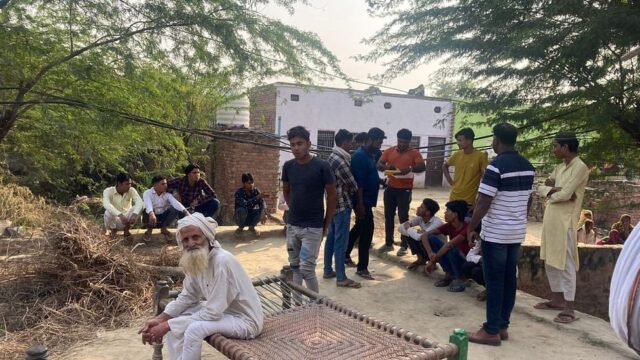The villages in Mewat are running a vast cybercrime industry involving three states: Uttar Pradesh, Haryana, and Rajasthan. The famous Netflix series “Jamtara,” being their inspiration, the cottage industry is accused of scamming innocent people and operating a sextortion racket.

Mewat As The Crime Centre
Mewat’s cybercrime hub has no leader, the entire village is allegedly involved in scams and a sextortion racket.
Police officers from Kerala and Rajasthan are tired of questioning the villagers about a Mewat resident who recently scammed a Malayali vegetable vendor of Rs. 32,798. Just one day before, the policemen had spotted the man’s location in the village, but now he is nowhere to be found. The villagers claim that he is missing for about two months now.
From sextortion to OLX scams, Mewat has become a more dangerous and modified version of “Jamtara.” The crimes reflect shrewdness yet lack sophistication, mainly because most of the scammers are truck drivers. In this self-guided cybercrime racket, literally, anyone with a spare cell phone and sim card can become a scammer and blackmail people.
The Additional Director General of Police, State Crime Branch, Haryana, Mr. O.P. Singh claimed, “They dry up their trail of crimes with fake IDs.” He added, “Our police investigators need to upskill.”
One Of The Sextortion Incidents

Deepak, a twenty-eight-year-old lad, was sexually blackmailed for money recently. At first, Deepak received a video call from an unknown number, where he saw an undressed woman sitting in front of the screen.
Shocked and disgusted, he hung up the phone straight away. Deepak didn’t realize at that time that even four seconds could get him into so much trouble.
After a few seconds, Deepak received another call, where a man told him that if he didn’t pay them Rs 5,000, they would make his four-second video clip viral on the internet, making sure that all his family and friends watch it.
Deepak claimed, “I think it was a man speaking. I was in shock. They asked me for Rs 5,000, or else they would send a screen recording of this ‘sex chat’ to my friends and family.” He added, “I told them I didn’t have the money.”
When he couldn’t gather the money by the next day, his friends and family received a link to the obscene video on Facebook. Deepak suspects the fraudsters gained access to his Facebook details from his phone number. Deepak was so terrified after the incident that he deactivated his account.
He said, “I was that victim in that situation, but I still felt guilty and ashamed.”
Two days later, he received a call from another unknown number, Truecaller verifying the number as that of the Delhi Police Crime Branch. As soon as he picked up the call, a man from the other end informed him that the police had one of his sexual clips and that he had to pay Rs 20,000 to have it removed from YouTube. Deepak understood that it was not the police and that he was being scammed again.
This is when Deepak figured out that he had become a victim of sextortion.
Also Read: Real Life Jamtara Style Sextortion: Strangers From Various Apps Strip On Video Calls
Wahid, One Of The Cybercriminals
The police officers of Rajasthan were notified about a 20-year-old truck driver named Wahid, who was caught with two mobile phones in his possession. One of the devices contained tons of online transactions in GooglePay and PhonePe, and the other device contained numerous obscene photos, videos, and chats along with screenshots of the monetary transactions.
Police officers claim that Wahid scammed innocent people through the OLX app, where he posted several ads for vehicles, and once the customers clicked on the links, he would blackmail them and ask for money.
However, Wahid’s old father and wife claim that Wahid is innocent. His wife Shehnaz said, “Of course, my husband is scared now, he’s been on the road driving for the last two months. It’s a lie.” Ayub, the father of Wahid, insists that his son didn’t do anything and that he was simply harassed by the police. Ayub said, “And if we were making that much money, would we be living with such a kitchen and latrine?”
Wahid’s victims on the other end were also not ready to give evidence for what happened to them. They were perhaps very embarrassed and intimidated by the events.
Ajay, a police official from Pahari in the Bharatpur District of Rajasthan, said, “Illiteracy is very high in this region. These are not very sophisticated scams. It’s not like Jamtara. Most scammers go for sextortion.”
On September 17th, Wahid was arrested by the police, and recently he was bailed out by his family members.
Questioning The Scammers
It becomes difficult to catch a cybercrime racket when there is no leader and an entire village seems to be involved. When the villagers of Mewat were subjected to questioning, it was a long session of pointing fingers and cheeky grins.
A 19-year-old local resident of Ikankha, Zakir Khan, declared that he does not even own a cell phone, while his friend named Ajroo, standing next to him, brazenly hinted that he would hand out Zakir’s number later.
Another man among them, called Mohammed Maneez, displayed his phone, which seemed like a model of Nokia 3310, and claimed that he was not on WhatsApp. Later, it was discovered that he did have WhatsApp.
Zakir exclaims, “Everyone here is uneducated. How can they be running scams?”
Mewat is quite conscious of its bad reputation. For instance, Gamdi village in Bharatpur is known as the crime house of that area. Officers also assert that the villagers purposely spade the soil and dig trenches so that police are unable to raid the village.
The inhabitants of Gamdi village, however, claim that they are always blamed because of their religion, that is because they are Muslims. One of the inhabitants of Ikankha, Kayub Khan, said, “It’s because we’re Muslim and we’re poor.”
He added, “When they see us doing well, building houses, buying bikes, they assume we’re doing so through crimes.” Kayub is a friend of fraudster Wahid, the 20-year-old truck driver.
An officer from the Bicchor Police Station of Haryana pointed out the big luxurious houses in the village of Nai in the Nuh district of Haryana and said, “Are you really telling me that truck drivers made this much money?” He added, “There’s no way they’re making this much, especially after the lockdown. They’re all running tatlus.”
Tatlus is a local Mewati term for scams.
Officers of Mewat have to put in a great deal of effort to keep a trail of cybercriminals. They have to track numerous fake IDs, fake SIM cards, fake profiles, and fake phone calls. Only they know what an arduous task it is to catch these scammers, especially when the victims are unwilling and too ashamed to testify.
Let us know what you think of the situation in the comment section below.
Disclaimer: This article is fact-checked
Image Credits: Google Photos
Source: The Print, India Today & Reddit
Find The Blogger: @ekparna_p
This post is tagged under: Mewat, sextortion, Jamtara, Netflix, Rajasthan, Haryana, Uttar Pradesh, scams, scammers, scandal, blackmail, blackmailing, money, obscene photos, obscene videos, fake profiles, fake SIM cards, fake IDs, phone number, mobile, WhatsApp, OLX, OLX scams, sextorted
Disclaimer: We do not hold any right, copyright over any of the images used, these have been taken from Google. In case of credits or removal, the owner may kindly mail us.
Other Recommendations:
Sextortion Is Rising In India And The Victims Are Mostly Men (Video)




































